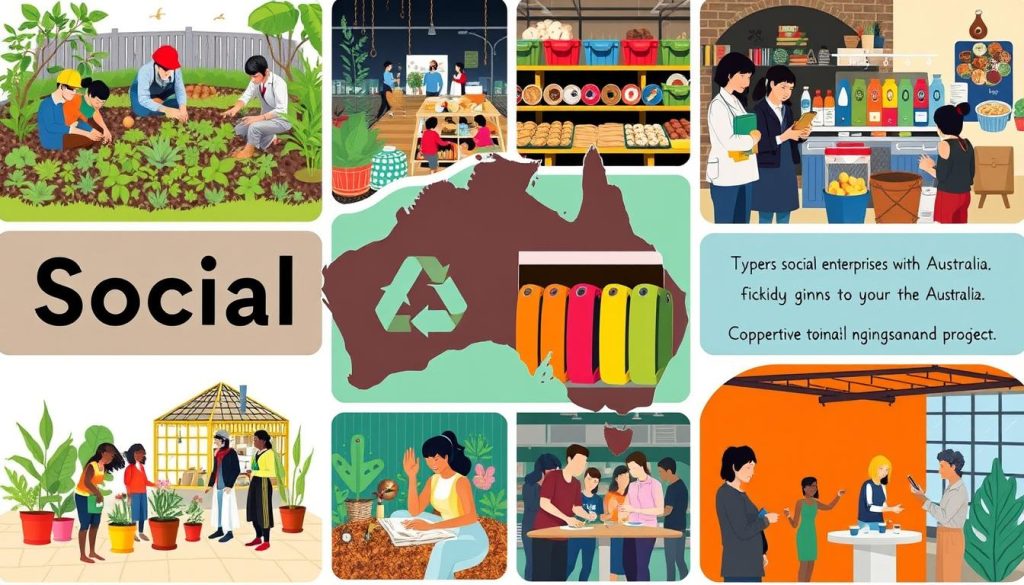Australia is leading the way in social entrepreneurship. Social enterprises here mix making money with making a difference. They create a model that is both sustainable and addresses big social and environmental issues.
Impact investing has become more popular, showing how social enterprises can help the economy and bring about positive change. This article looks into the growing world of social enterprises in Australia. It explores their different models, the challenges they face, and the many chances for entrepreneurs who want to make a positive impact.
Understanding Social Enterprises

Social enterprises are key in linking the business and non-profit worlds. They aim to achieve both social goals and financial success. This mix helps them solve big social problems.
Definition and Characteristics
Social enterprises are groups that use new ways to solve social issues. They stand out because they:
- Have a clear goal to help society or the environment.
- Use their profits to make a bigger difference.
- Listen to a broad group of people, not just investors.
- Work with local communities to help more people.
Diverse Models of Social Enterprises
There are many types of social enterprises, each tackling different community needs. Some common ones are:
- Worker cooperatives, where staff own and run the business.
- Non-profit groups that make money to fund their goals.
- Social firms that offer jobs and services at the same time.
These models show how different approaches can really help communities and make a big difference.
The Importance of Social Enterprises in Australia

Social enterprises are key in Australia’s economy and society. They help communities and solve big problems. Their work improves lives and boosts local economies.
Impact on Local Communities
Social enterprises make a big difference in local areas. They tackle issues like joblessness and homelessness. They create jobs and help people develop skills, making communities stronger.
- Promotion of local employment by driving job creation
- Encouragement of skill development and training programs
- Provision of services tailored to community needs
- Enhancement of social capital through engagement and collaboration
Contribution to Economic Growth
Social enterprises are linked to economic growth. They work in local markets, helping the economy grow. They aim to make money and do good, benefiting everyone.
- Creation of new markets and business opportunities
- Attraction of investment through social value propositions
- Strengthening local supply chains
- Boosting consumer engagement through community-oriented products and services
Types of Social Enterprises in Australia

Australia has a wide range of social enterprises. Each one tackles different social issues. By looking at these types, we can see how this sector is growing. Community interest companies, cooperatives, mutuals, social firms, and not-for-profits show the variety in their goals and ways of working.
Community Interest Companies
Community interest companies (CICs) aim to help the community. They make money and use it to help others. CICs have rules to make sure they really help the community.
This makes them more flexible than charities but still focused on social goals.
Cooperatives and Mutuals
Cooperatives and mutuals are run democratically. Members get to decide how things are done. They provide services or products that meet their members’ needs.
This way, they build strong communities and help the economy grow.
Social Firms and Not-for-Profits
Social firms and not-for-profits focus on jobs and helping people. Social firms give jobs and training to those who might struggle to find work. Not-for-profits use donations to fund their work.
Both are all about making a difference and helping the community, not just making money.
Legal Framework for Social Enterprises

The legal rules for social enterprises in Australia are key to their success. It’s vital for entrepreneurs to know the social enterprise laws well. This knowledge helps them run their organisations well.
Key Legislation
Many laws help social enterprises in Australia work well. The Australian Charities and Not-for-profits Commission Act is a big one. It helps make sure these groups are open and honest, which builds trust.
- The Australian Charities and Not-for-profits Commission Act, 2012
- The Corporations Act, 2001
- The Income Tax Assessment Act, 1997
Regulatory Bodies and Compliance Requirements
Several groups watch over social enterprises to make sure they follow the rules. The Australian Charities and Not-for-profits Commission (ACNC) is a big one. It helps charities follow the law and gives them support.
Local governments also have rules that can differ by state. It’s important for social enterprises to follow these rules to avoid trouble.
- Australian Charities and Not-for-profits Commission (ACNC)
- Corporate Affairs Commissions
- Local Government Authorities
Following the law and knowing what’s expected is crucial for social enterprises. Not following the rules can cause problems and harm their reputation.
Identifying Social Enterprise Opportunities in Australia

Finding good social enterprise opportunities needs a sharp eye for what’s possible in different sectors. It also helps to know where social entrepreneurship thrives. Australia is full of chances for new ideas in several key areas.
Sector-Specific Opportunities
The healthcare, education, and environmental services sectors are full of chances for social entrepreneurs. They tackle big social problems and have lots of room to grow. For example:
- The healthcare sector is ripe for ideas that make services more accessible and affordable.
- In education, social businesses can create programs for those who need help, focusing on skills and learning for life.
- Environmental services are full of chances for projects that promote sustainability and cut down on waste.
Geographic Hotspots for Social Enterprises
Knowing where to start in Australia can make a big difference. Places like Melbourne and Sydney are great because they have lots of support. They have investors, incubators, and people who share your vision. Also, areas like Queensland and Tasmania are getting more into social entrepreneurship. They offer chances for solutions that fit their local needs.
Social Enterprise Opportunities in Australia

The social enterprise scene in Australia is changing. It’s responding to society’s needs and the economy’s demands. Trends in sustainability and digital innovation are creating new chances in the sector. Social entrepreneurs are learning to work together and with governments to make a big difference.
Emerging Trends and Areas of Growth
There’s a big push for sustainability, which matches global efforts to fight climate change. Social businesses are now focusing on being green. This attracts customers and investors who care about the planet. Other areas seeing growth include:
- Using technology to improve services and make things more efficient.
- Creating new business models that put community first and share benefits.
- Developing ways to measure social impact, so everyone can see the good being done.
Collaborations with Government and NGOs
Working with the government is key for social enterprises. They get funding, support, and resources. Team-ups with NGOs add valuable skills and connections. These partnerships help tackle big social issues. Some examples are:
- Working together on projects that help local communities.
- Joining forces to use resources for the greater good.
- Sharing knowledge to drive innovation and share best practices.
Funding Options for Social Enterprises

Getting the right funding is key for social enterprises to grow and thrive. There are many ways to get money, from government grants to impact investment and crowdfunding. These options help social ventures make a real difference.
Grants and Government Support
Grants are a top choice for social enterprises. They give money without expecting it back, letting groups focus on their goals. Governments offer grants to help tackle big social issues.
Programmes like the Community Business Fund and the Social Enterprise Investment Fund help a lot. They give money to new and exciting projects.
Impact Investors and Social Venture Capital
More people want to invest in a way that helps society. Impact investors look for projects that make money and do good. They give big sums of money and offer advice to grow the business.
Crowdfunding Platforms
Crowdfunding is a big hit for social enterprises. It lets them share their ideas with more people. Sites like Kickstarter and GoFundMe help get money from supporters.
This approach not only funds projects but also builds a community. It gets people excited and involved in the venture’s success.
Challenges Faced by Social Enterprises

Social enterprises face many challenges that can slow their growth. Two big issues are financial problems and figuring out their social impact. It’s key to tackle these to stay strong and make a real difference.
Financial Sustainability Issues
Getting financially stable is a big challenge for social enterprises. They have to balance making money with helping society. Several things affect their financial health, such as:
- Limited access to traditional funding sources
- High operational costs
- Competition with conventional businesses
- Difficulty in scaling profitable models while maintaining social goals
To beat these challenges, social enterprises need strong financial plans. They should look for new ways to fund their work.
Measuring Social Impact
Showing their social impact is a big worry for many social enterprises. A good way to show this is through social impact assessment. This helps attract investors and partners. Some ways to do this include:
- Using both qualitative and quantitative metrics to measure outcomes
- Setting key performance indicators (KPIs) that show social goals
- Doing regular impact evaluations to guide decisions
By focusing on measuring social impact well, enterprises can show their worth. This helps them get the support they need to stay financially stable.
Success Stories of Social Enterprises in Australia

Australia is full of social enterprises that show the power of social entrepreneurship. These stories highlight how to tackle social problems and still make money. They give new entrepreneurs valuable lessons and models to follow.
Case Studies of Notable Enterprises
The Big Issue is a great example. It’s a magazine sold by homeless people. It helps them earn money and raises awareness about homelessness. Boosting Business is another example. It helps people with disabilities find jobs.
These examples show how social businesses can make a big difference. They can change lives and stay financially stable.
Lessons Learned from Successful Models
Successful social businesses teach us important lessons. Building strong community ties is key. It helps gain trust and support.
It’s also important to measure social impact. This shows value to others and helps get funding. Diversifying funding can also help a business grow and stay strong.
Resources for Aspiring Social Entrepreneurs

Starting a journey as a social entrepreneur needs good resources. These help improve skills and grow networks. There are many training programs for learning the basics of starting a social business.
These programs include workshops, seminars, and online courses. They are designed for different levels of entrepreneurship.
Training and Development Programs
Many groups offer training for social entrepreneurs. These courses teach important skills like managing money, measuring social impact, and raising funds. Some top resources are:
- The School for Social Entrepreneurs, which gives practical education and support.
- Social Enterprise UK, with training options like workshops and mentoring.
- The Young Foundation, known for its innovative training in social innovation.
Networking and Collaboration Platforms
Networking is key for social entrepreneurs. It helps find partners and grow impact. There are many places to connect:
- Social Enterprise UK hosts events and forums for entrepreneurs.
- The Social Entrepreneur Network is for sharing experiences and ideas.
- Meetup groups for social innovation offer face-to-face meetings.
Using these resources can give social entrepreneurs the support they need. It helps them on their way to making a big difference.
Policy and Advocacy for Social Enterprises

The policy landscape is key to the growth of social enterprises in Australia. To help these businesses, we need strong policies that tackle their special challenges. Advocacy groups are working hard to make people understand the value of social enterprises in changing communities.
Current Policy Landscape
In Australia, the policy scene is always changing. Governments are trying to fit social enterprises into the bigger picture of economy and society. There’s a growing awareness of how these businesses help solve big problems and boost the economy.
Local and national governments are talking about the need for more funding and rules that help social enterprises grow. This is a big step towards supporting these innovative businesses.
Advocacy Initiatives and Their Impact
Many advocacy efforts are underway to support social enterprises. These campaigns try to change public views and push for laws that help these businesses thrive. Groups like Social Traders and the Australian Centre for Social Innovation have made a big difference.
They’ve helped change policies to support social impact ventures. This shows how important it is to keep advocating for social enterprises to get the support they need.
The Role of Technology in Social Enterprises

Technology is key in today’s fast-paced world for social enterprises. It boosts their impact and makes them more efficient. Tools and platforms help these groups reach more people and serve their communities better.
Innovative Technologies Driving Impact
Many new technologies are helping social enterprises a lot. They use artificial intelligence, data analytics, and mobile apps to tackle big social problems. Here’s how they make a difference:
- Data Analytics: It helps them understand needs and track results, improving their plans.
- Artificial Intelligence: AI tools predict trends and automate tasks, saving time and resources.
- Mobile Technology: Mobile apps let them connect directly with people, making services more accessible.
Digital Marketing Strategies for Social Enterprises
For social enterprises to grow, they need good digital marketing. Using digital tools helps them share their mission and achievements. Here are some key strategies:
- Social Media Engagement: Using sites like Facebook and Twitter helps them build communities and talk to people.
- Content Marketing: Telling stories about their mission grabs attention and support from many.
- Email Campaigns: Targeted emails keep supporters involved and attract new ones to join.
Building Partnerships for Social Impact

Creating meaningful partnerships is key to making a difference in communities. When social enterprises and corporates work together, businesses can help a lot with social causes. This not only helps with corporate social responsibility but also gives social enterprises the tools they need.
Good partnerships bring benefits to both sides. Corporates share their knowledge and skills with social enterprises. This helps everyone involved.
Collaboration with Corporates
Working with corporates can really help social enterprises grow. There are many ways to partner:
- Financial support through sponsorships and donations.
- Access to professional expertise in marketing, strategy, and operations.
- Co-development of innovative solutions addressing specific social issues.
Businesses can improve their image by supporting community projects. This leads to lasting positive change.
Engaging with Local Communities
Getting involved with local communities is crucial for social enterprises. Building strong partnerships with locals helps build trust. Here are some ways to engage:
- Hosting community events to gather feedback and ideas.
- Collaborating with local organisations to understand specific needs.
- Providing volunteer opportunities to foster involvement.
These actions encourage people to get involved. They make sure the work done is what the community wants. This way, social enterprises can make a bigger difference.
Future of Social Enterprises in Australia
The future for social enterprises in Australia looks bright, with big changes on the horizon. Sustainability will be key, as these organisations tackle big social and environmental issues. This move matches the global push for sustainable development and meets the growing demand for ethical choices.
Adopting sustainable business models is crucial for social enterprises to grow and stay relevant. In a competitive market, this is essential for their success.
Predicting Trends in the Sector
There’s a big push for measuring impact and being open about it. Social enterprises are now focusing on showing their social value. This helps them win support and funding.
Technology will also play a big part in helping them. It will make their work more efficient and reach more people. We’ll see more partnerships between social enterprises, governments, and private companies working together.
Opportunities for International Collaboration
Working with others around the world opens up new chances for Australian social enterprises. They can learn from and share ideas with others. This not only boosts their knowledge but also helps their projects reach further.
As they face global challenges, they will become more connected. They will use international networks to grow and make a bigger difference. The future looks bright for those ready to take on the world.
















